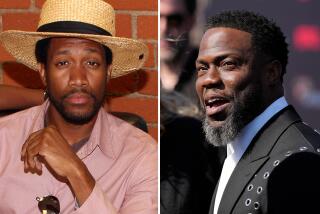Michael Jackson family’s civil trial blames AEG in singer’s death
With the conviction this week of Michael Jackson’s doctor on an involuntary manslaughter charge, the question of blame in the pop star’s death shifts to a new and much wealthier defendant: Los Angeles entertainment behemoth Anschutz Entertainment Group.
The conclusion of the criminal case sets the stage for proceedings in civil court, where the pop star’s mother and children are pressing a wrongful death suit against the corporation and its concert subsidiary, AEG Live, the promoter of Jackson’s doomed comeback attempt.
The civil case, set for trial in September, pits the singer’s three children and elderly mother against one of the city’s most important companies at a time when AEG is pitching controversial plans for a downtown football stadium.
FULL COVERAGE: The trial of Dr. Conrad Murray
The case involves many of the same issues as the criminal trial: propofol, Jackson’s performance anxiety and the medical choices of Dr. Conrad Murray.
But the proceedings are expected to delve into areas the criminal judge barred as irrelevant to Murray’s role, including Jackson’s finances and years of drug problems.
“The conviction of Dr. Murray is just the beginning of bringing forth the truth on what happened to Michael Jackson,” said Brian Panish, an attorney for the Jackson family. “Forces much larger than Dr. Murray were involved in this tragedy.”
Lawyers for the Jacksons, who are seeking an unspecified amount of money, have portrayed AEG in court papers as a heartless, bottom-line-driven business that contributed to the singer’s death by pressuring him to prepare for performances he wasn’t physically capable of pulling off. That pressure, they have written, pushed him toward Murray and the nightly use of propofol, a surgical anesthetic, for his insomnia.
“AEG said that if they called off the Tour, there would be lawsuits and Jackson’s career would be over. They said Jackson must work with Murray,” the Jacksons’ lawyers wrote in a complaint last year.
AEG has denied the allegations in court filings, with its lawyers saying the company “in no way actually controlled” the singer.
“Michael Jackson was not helpless or incompetent; he lived in his own home, negotiated his own contracts, engaged his own attorneys, and cared for his own family,” lawyers for the company wrote. “He at all times retained the option of refusing Dr. Murray’s services, or of canceling his agreement with AEG.”
The company’s concern with the civil matter was on display at Murray’s trial. The lead attorney for AEG in the wrongful death suit, Marvin Putnam, sat in the well of the court facing the witness box as three company officials testified.
Each of them told jurors that the company had no indication that Murray was anything but a competent physician, with his famous patient’s best interests at heart.
“Dr. Murray told me repeatedly that Michael Jackson was perfectly healthy, in excellent condition,” said Kathy Jorrie, a lawyer who helped draft Murray’s $150,000-a-month contract.
Murray is not named in the suit filed by Katherine Jackson and her grandchildren, although he is named in a separate claim by the singer’s father.
A lawyer for Katherine Jackson and her grandchildren said the choice not to sue the doctor reflected the family’s belief that AEG bore primary responsibility.
“We believe the evidence shows that there is much more involvement from AEG, and that Murray’s a minor player,” Panish said.
Other legal experts saw a different calculus.
“He’s got no money,” said Loyola Law School professor Stan Goldman of the heavily indebted physician. It was smart strategy, he said, to keep Murray away from civil jurors: “Keep the focus on the deep pockets.”
It was AEG Live’s substantial resources that made the deal attractive to the financially troubled Jackson in the first place, and it is the dynamic between the rich company and the cash-strapped performer that is at the heart of the suit. The company advanced Jackson money against future concert earnings to cover every aspect of his life and had the right to seize his assets if he failed to perform at 50 London shows.
In court papers, Katherine Jackson’s lawyers have said the relationship created a legal duty on the part of AEG “to treat him safely and to not put him in harm’s way.” They said AEG breached those duties by contracting with Murray, who they allege went along with their only interest: ensuring that Jackson could perform.
During the criminal trial, AEG officials testified that Murray was Jackson’s choice and that they had wanted to hire a British doctor.
“He was very firm. He said no, I need my own physician and I need him 24-seven,” said Randy Phillips, chief executive of AEG Live.
Murray worked for Jackson for two months but was never paid by AEG because the singer hadn’t yet signed the contract, a point that Jorrie, the contract lawyer, noted several times in her testimony.
The civil case is expected to yield far more details about Jackson’s problems than the criminal trial did.
“Generally in civil court, the range of issues to be decided is far broader than they ever are in a criminal case; and that means a lot more evidence comes in,” said David M. Ring, a Los Angeles lawyer who has sued on behalf of plaintiffs in wrongful death cases. “Instead of just looking in the closet, you are looking in the whole house.”
Katherine Jackson’s lawyer said he expected that civil jurors would learn vastly more about the singer’s relationship with AEG than their criminal-case counterparts did. The case file already includes a copy of Jackson’s contract with the promoter, a document kept out of the manslaughter case. Details about Jackson’s long-standing financial problems — another subject prohibited in criminal court — would be central to the case against AEG.
Putnam and AEG declined to comment. To defend itself, the company could present unflattering information about Jackson’s substance abuse, his seeking of propofol from various physicians dating to the 1990s and his often rocky relationship with his family. None of those topics were allowed at the criminal trial.
Although the suit is still in its early stages, both sides have claimed some victories. Earlier this year, a judge threw out some portions of the Jacksons’ suit, including allegations of fraud and negligent infliction of emotional distress on the singer’s children. Superior Court Judge Yvette M. Palazuelos ruled that the remainder of the claims — including breach of contract and negligence in hiring Murray — could go forward on the theory that Jackson “was particularly vulnerable and dependent” on AEG.
More to Read
The biggest entertainment stories
Get our big stories about Hollywood, film, television, music, arts, culture and more right in your inbox as soon as they publish.
You may occasionally receive promotional content from the Los Angeles Times.












